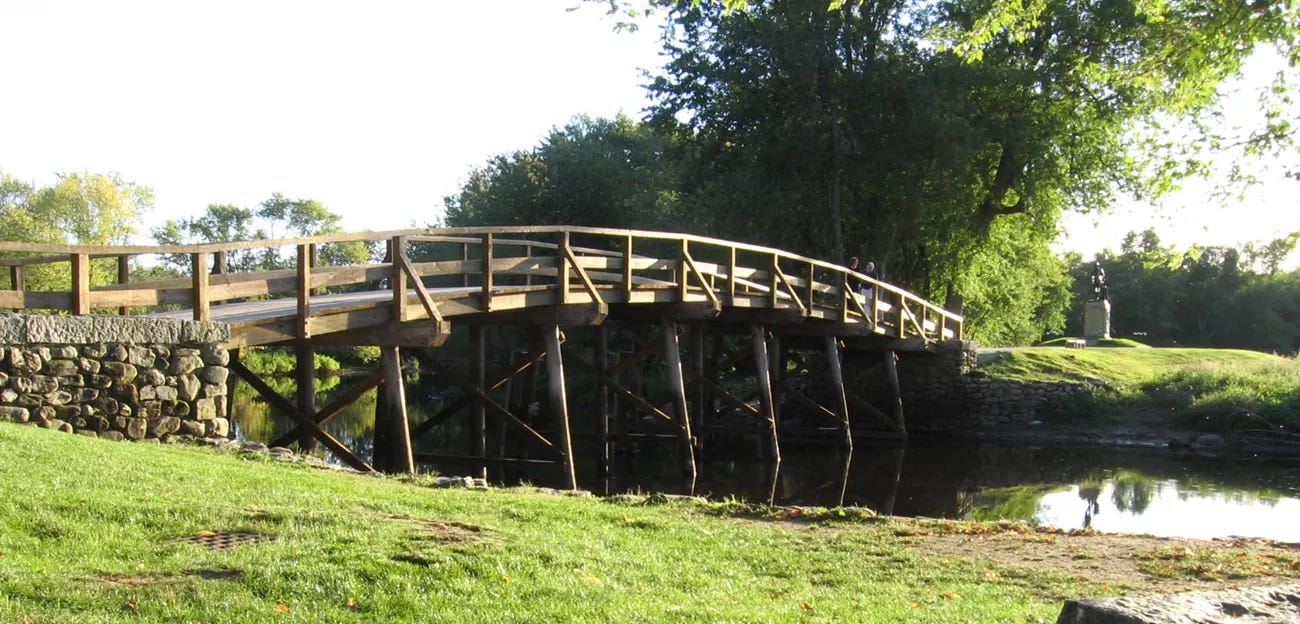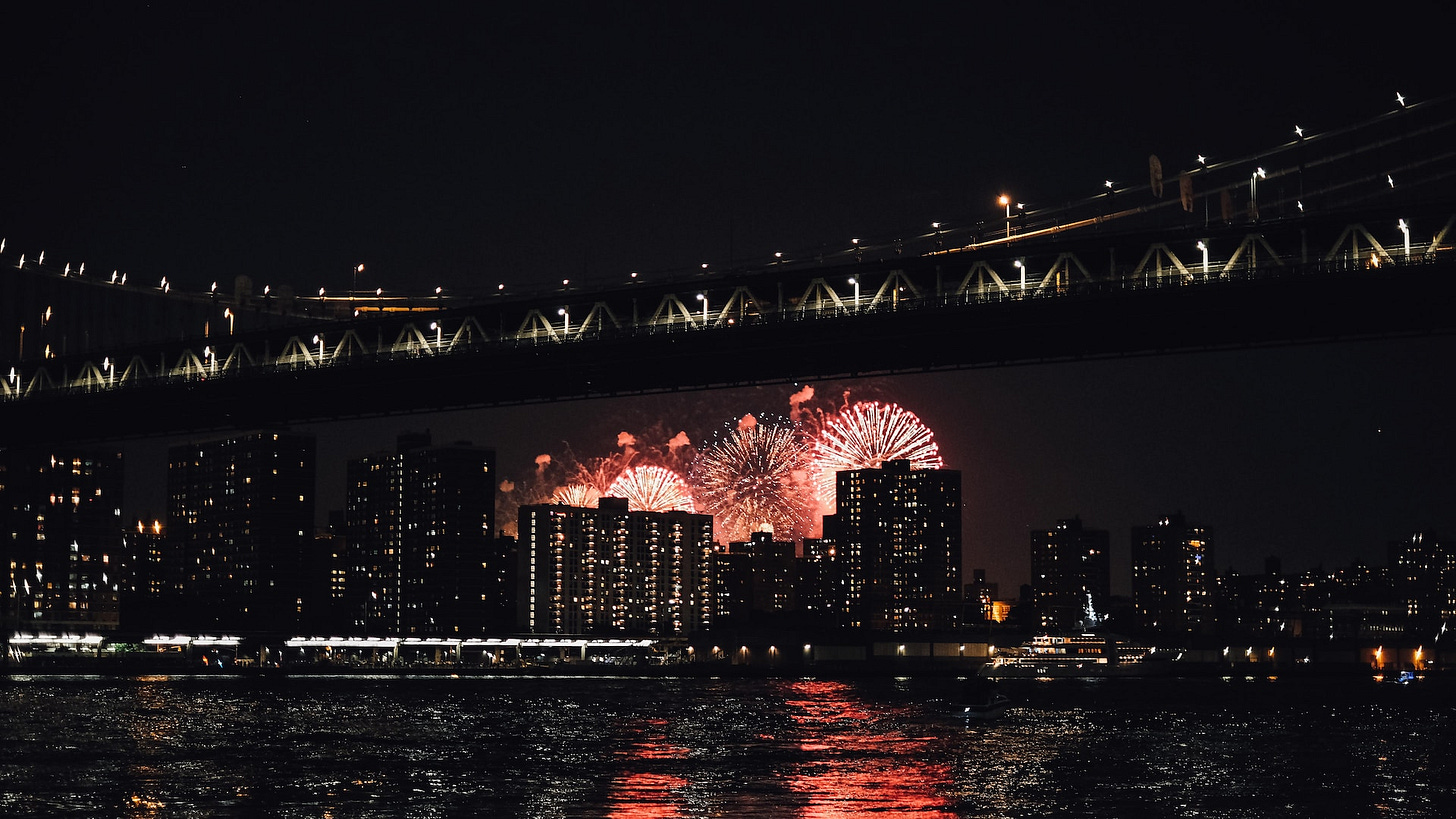Independence Day

America had a long birthday.
Tensions had been building for some time, but the first day America declared her independence was April 19, 1775, at the North Bridge in Concord, Massachusetts. On that day the first Americans fired on British troops, referred to as “Redcoats” because of their red coats. Walking the North Bridge grounds and those of other nearby historic sites in Concord and Lexington gives you an appreciation of the area's rich history.
Ralph Waldo Emerson wrote Concord Hymn to honor the occasion. Its opening lines:
By the rude bridge that arched the flood,
Their flag to April's breeze unfurled,
Here once the embattled farmers stood
And fired the shot heard round the world.
It took until July 4, 1776 for the 2nd Continental Congress to write, finalize the language, and adopt the words of the Declaration of Independence. From there our birthday wasn’t complete until September 3, 1783, when British and American representatives signed the Treaty of Paris, ending the American Revolution and granting America her independence.
All told there were more than 3,000 days of fighting. America rarely won a decisive battle in the more than eight-year war. The British were the military superpower, the Americans fledgling farmers. America had some advantages, in distance, logistics, and communications, but America’s advantages were not decisive. The British occupied New York City for seven years, beginning in August of 1776. News of the Treaty of Paris didn’t reach New York until General Washington entered the city and ended the British occupation in November of 1783.
America gained her independence because we were committed. Committed to the ideal that we are created equal. Committed to fighting for the rights of other Americans, and committed to fighting against the tyranny of those who would refuse rights to citizens equally.
The last sentence of the Declaration of Independence best demonstrates our commitment:
And for the support of this Declaration, with a firm reliance on the protection of divine Providence, we mutually pledge to each other our Lives, our Fortunes and our sacred Honor.
On July 4, 1776 we didn’t declare our willingness to go to war. We were already at war. We had no choice but to continue to fight against the tyranny of the British government. On July 4 we declared our willingness to die for each other, to sacrifice our property and businesses for each other, and to give away our dignity and honor for each other. We declared to King George and the British monarchy that we would die for each other before we gave up.
Were we perfect? No. Not even less than perfect. There were loyalists, also called Tories, who held allegiance to Britain and were motivated by money and the desire to keep things as they were. There were pacifists, who refused to acknowledge allegiance to America. Revolutionaries published pamphlets such as Thomas Paine’s Common Sense in support of independence, while those opposed to American independence published competing pamphlets such as James Chalmers‘ Plain Truth. All told a majority of Americans fought for independence and the American ideal, but there were loud voices of dissent.
Not so different from today. Nearly 250 years later we are still not perfect. Today, as then, a majority fights on for representative government, for liberty of all Americans, and for the rights of others.
I believe this majority of Americans still believes in the ideal, and we believe in each other.
Today I raise a toast to you and yours, and I wish you a great fireworks show.
Thanks for considering my perspective.
May God bless the United States of America.
Postscript.
A modern-language interpretation of Americans’ complaints against King George:
King George III refused to approve laws that were in the best interest of the public.
He prohibited his governors from passing important laws unless he approved them first, and then often ignored them.
He refused to pass laws that would give more people representation in government, even though they were willing to give up other rights in exchange.
He called legislative bodies to meet in inconvenient and distant locations, making it difficult for them to do their work.
He dissolved representative assemblies that opposed his policies.
He refused to call new elections after dissolving assemblies, leaving the people without representation.
He tried to prevent people from immigrating to the colonies, obstructing laws that would have made it easier for them to do so.
He obstructed the administration of justice by refusing to approve laws that would have established a judiciary.
He made judges dependent on him for their jobs and salaries, giving him control over the judicial system.
He created new offices and sent officials to the colonies to harass the people and take their money.
He kept standing armies in the colonies during peacetime without the consent of the legislatures.
He made the military independent of and superior to the civilian government.
He made deals with other countries to subject the colonies to their laws.
He allowed British troops to live in the colonies and refused to punish them for crimes they committed against the colonists.
He cut off trade between the colonies and other countries.
He taxed the colonists without their consent.
He denied the colonists the right to a trial by jury in many cases.
He transported colonists to other countries to be tried for crimes they did not commit.
He abolished the English system of laws in a neighboring province and established an authoritarian government there.
He took away the colonies' charters, abolished their laws, and changed their forms of government.
He suspended the colonies' legislatures and declared that he had the power to make laws for them.
He declared that the colonies were no longer under his protection and waged war against them.
He plundered the colonies' coasts, burned their towns, and killed their people.
He transported foreign mercenaries to the colonies to continue his campaign of death, destruction, and tyranny.
He forced captured American sailors to fight against their own country.
He incited rebellions among the colonists and encouraged Native Americans to attack them.



